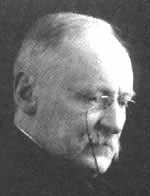Sinological Profiles
J J M de Groot
1854 - 1921
Jan Jakob Maria de Groot was essentially a historian of religion. Like many then and since, he thought that one spiritual essence could be detected beneath a great variety of religious, philosophical, and even political expressions in China, and his lifework was the discovery and exposition of that essence. At the end of the 19th century, he and Schlegel were the chief ornaments of Sinology at Leiden. de Groot in 1902 moved to Berlin, and a bid by the young Otto Franke to succeed him at Leiden came to nothing (at Berlin, he was eventually succeeded in 1923 by an older Otto Franke). de Groot was of the stiff authoritarian school, which recognized no place in Sinology for criticism of Sinologists, and the efforts of Haenisch to find a role at Berlin in de Groot's time for the undoubtedly rude von Zach came to nothing. For that matter, Haenisch's own role at Berlin came in the end to not very much.
De Groot's works are his contribution. They indicate a capacity for synthesis, which Franke also had, and which the no less authoritarian Pelliot conspicuously lacked. They show a beginning in observation and an end in abstraction, which is undoubtedly the correct procedure. At any rate the reverse method has so far not produced results commensurate with the claims made for it. As to the soul of China, the conclusions of Creel, who started roughly where de Groot ended, and wound up in an altogether different corner of things, may usefully be compared.
E Bruce Brooks
References
- J J M de Groot. Les Fêtes Annuellement Célébrées à Émoui (Amoy): Étude Concernant la Religion Populaire des Chinois / par J J M de Groot; Traduite du Hollandais, avec le Concours de l'Auteur par C G Chavannes (Annales du Musée Guimet v10-11). 2v Leroux 1886
- J J M de Groot. La code du Mahâyâna en Chine. [Amsterdam] Müller 1893
- J J M de Groot. The Religious System of China, Its Ancient Forms, Evolution, History and Present Aspect, Manners, Customs and Social Institutions Connected Therewith (published with a subvention by the Dutch Colonial Government). 6v Brill 1892-1910
- J J M de Groot. Sectarianism and Religious Persecution in China: A Page in the History of Religions (Verhandelingen der Koninklijke Akademie van Wetenschappen). 2v Amsterdam 1903-1904
- J J M de Groot. The Religion of the Chinese (The Hartford-Lamson Lectures on the Religions of the World). Macmillan 1910)
- J J M de Groot. Religion in China: Universism. A Key to the Study of Taoism and Confucianism. Putnam 1912
- J J M de Groot. Universismus, die Grundlage der Religion und Ethik, des Staatswesens und der Wissenschaften Chinas. [Berlin] Reimer 1918. An expansion of the preceeding item.
9 June 2004 / Contact The Project / Exit to Sinology Page
